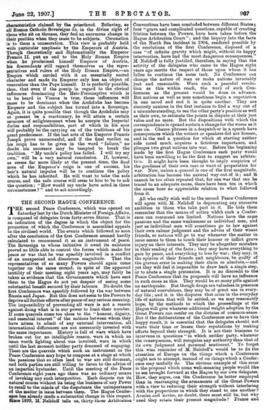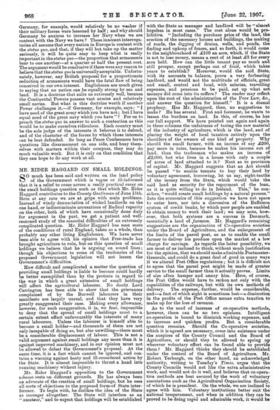THE SECOND HAGUE CONFERENCE.
IIIHE second Peace Conference, which was opened on A Saturday last by the Dutch Minister of Foreign Affairs, is composed of delegates from forty-seven States. That is an indication of the degree in which the object for the promotion of which the Conference is assembled appeals to the civilised world. The events which followed so soon after the conclusion of the first Conference seemed hardly calculated to recommend it as an instrument of peace. The Sovereign to whose initiative it owed its existence proved so little able to control the forces which make for peace or war that he was speedily involved in a conflict of an unexpected and disastrous magnitude. That the representatives of so many Powers should again come together on the same errand, in spite of the apparent inutility of their meeting eight years ago, may fairly be taken as evidence that the Governments which have sent them to the Hague do net yet despair of seeing some substantial benefit secured by their labours. No doubt the first Conference was speedily followed by the war between Russia and Japan. But this does not seem to the Powers to deprive all further efforts after peace of any serious meaning. The impossibility of preventing all wars is not a reason against doing what is in 'our power to limit their number. If some quarrels come too close to the " honour, dignity, and essential interest" of the nations between whom they have arisen to admit of any external intervention, all international differences are not necessarily invested with the same importance. History is full of wars which have broken out for no intelligible reason, wars in which no issue worth fighting about was involved, wars in which until the last moment neither party dreamed of engaging. These are the quarrels which such an instrument as the Peace Conference may hope to compose at a stage at which the passions that so often lead to war are still dormant, and both .parties axe still willing to listen to the advice of an impartial bystander. Until the meeting of the Peace Conference eight years ago there was no ordinary means of invoking any such interposition. Each dispute ran its natural course without its being the business of any Power to recall to the minds of the disputants the unimportance of the matter in issue between them. The Hague Confer- ence has already made a substantial change in this respect. Since 1899, M. Nelidoff tells us, thirty-three Arbitration Conventions have been c.onoluded between different Statesi four "grave and complicated questions, capable of creating friction between the Powers, have been taken before the Hague Arbitration Court" ; and the inquiry into the facts of the North Sea incident in 1904, rendered possible by the resolutions of the first Conference, disposed of a case "of infinite gravity which might, without its happy intervention, have had the most dangerous consequences.' M. Nelidoff is fully justified, therefore, in saying that the activity of the delegates who came to the Hague eight years ago merits the respect of those upon whom it has fallen to continue the same task. No Conference can change the nature of man or make nations invariably just and reasonable. Were such a peaceful revolu- tion as this within reach, the work of such Con- ferences as the present would be done in advance. But nations as well as men sometimes begin a negotiation in one mood and end it in quite another. They are sincerely anxious in the first instance to find a way out of a misunderstanding, to see the other party's position as well as their own, to estimate the points in dispute at their just value and no more. But the dispositions with which the correspondence is opened sustain a change for the worse as it goes on. Chance phrases in a despatch or in a speech have consequences which the writers or speakers did not foresee, and in the end a question for which at starting neither side cared much acquires a fictitious importance, and plunges two great nations into war. Before the beginning made by the first Hague Conference each party would have been unwilling to be the first to suggest an arbitra- tien. It might have been thought to imply suspicion of the goodness of their own case or want of preparation for war. Now, unless a quarrel is one of the first magnitude. arbitration has become the natural way out of it ; and it cannot be too often repeated that, for one war that can be traced to an adequate cause, there have been ten in which the cause bore no appreciable relation to what followed from it.
All who really wish well to the second Peace Conference will agree with M. Nelidoff in deprecating any excessive ambition in those who take part in it. He bids them remember that the means of action whtch such a Confer. ence can command are limited. Nations have the sayie passions and the same weaknesses as individual men, and just as individual men will sometimes go to law against their own calmer judgment and the advice of their wisest friends, so nations will go to war whenever the matter in issue seems to them to touch their honour or inflict grave injury on their interests. They may be altogether mistaken in their reading of the facts ; they may have everything to • gain by peace, and everything to lose by war ; they may, in the opinion of their friends and neighbours, be guilty of the gravest error in making their claim so absolute,—and yet they will feel it impossible to draw back a single step, or to abate a single pretension. It is no discredit to the' Peace Conference that its proposals will have no influence in such cases as this. They would be so many pills against an earthquake. But though drugs are valueless in presence of natural convulsions, they may be of great use in every- day life ; and it is the disputes that arise in the everyday life of nations that will be settled, as we may reasonably hope, by the methods to which the proceedings at the Hague will give whatever additional weight adoption by the Great Powers can confer on the dictates of common-sense. But if the deliberations of the Conference are to have this happy result, it is essential that the delegates should not • waste their time or lessen their reputations by making' efforts beyond their strength. It is not their business to intervene in questions " in which neither party, whatever the consequences, will recognise any authority than that of its own judgment and personal sentiment." To forget this wise reminder of M. Nelidoff's would be to fix the attention of Europe on the things which a Conference ought not to attempt, instead of on things which a Confer- ence may usefully do. The obvious example of this error is the proposal which some well-meaning people would like to see brought forward at the Hague by our own delegates. How, they argue, can the Conference be better employed than in rearranging the armaments of the Great Powers with a view to reducing their strength without interfering with the proportions in wbich they stand to one another ? Armies and navies, no doubt, there must still be, but why need they retain their present magnitude? France and Germany, for example, would relatively be no weaker if their military forces were lessened by half ; and why should Germany be anxious to increase her Navy when we are content with the Navy we have ? These innocent interroga- tories all assume that every nation in Europe is content with the status quo, and that, if they will but take up the matter seriously, it will be quite easy to keep what is really important in the status quo—the proportion that armaments bear to one another—at a quarter or half the present cost. The argument would be conclusive if there were any reason to believe that the status emirs universally acceptable. Unfortu- nately, however, any British proposal for a proportionate reduction of armaments would have the fatal flaw of being conceived in our own interest. Englishmen are much given to saying that no nation can be equally strong by sea and land. It is a doctrine that suits us extremely well, because the Continental Powers possess vast armies and relatively small navies. But what is this doctrine worth if another Power challenges Germany, for example, says : "I have need of the great army which you have not ; but I have equal need of the great navy which you have " ? For us to preach the status quo in answer to such a contention as this would be to make ourselves ridiculous. Each country must be the sole judge of the interests it behoves it to defend, and of the character of the forces by which those interests can be best defended. So long as Peace Conferences leave questions like disarmament on one side, and busy them- selves with matters .within their compass, they may do much valuable work. But it is only on that condition that they can hope to do any work at all.











































 Previous page
Previous page